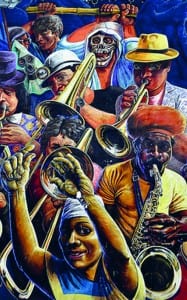“History is important because the results of history are still with us”
By news editor, on 3 July 2013
![]() Written by Ashley Cowburn, UCL History 2013
Written by Ashley Cowburn, UCL History 2013
How did you react to Baroness Thatcher’s funeral? Were you present among the hundreds of people who gathered in Goldthorpe to witness an effigy of Thatcher set alight, accompanied with chants of ‘sc um!’?
um!’?
Or were you mourning at the steps of St. Paul’s Cathedral, paying tribute to one of Britain’s longest serving prime ministers?
The point to this juxtaposition, as Dr Andrew Flinn (UCL Information Studies) proposed in his Lunch Hour Lecture, ‘Hidden No Longer: Community history-making’ on 25 June, was not a question of ‘respect’. Rather, Thatcher’s funeral unearthed emotional histories of community remembrance.
In Nottinghamshire, former mine workers gathered for a minute’s silence to mark the demise of their community. In Grantham – the birthplace of the former PM – a rose was unveiled in her memory, celebrating Thatcher’s intrinsic involvement in the community history.
Only by exhuming hidden community histories, Dr Flinn argues, can we fully appreciate the incredibly diverse – and ‘inevitable’ – nature of the reaction to the funeral.
Over the past half a century, independent projects such as the Island History Trust and the People’s History Museum have attempted to record and tell the narrative of Britain’s hidden community histories. By gathering an immense amount of photographs, oral recollections, and emotional memories, a powerful archive is now available to anyone wanting to learn more about communities that were once hidden with time.
London Docklands – a fitting scene, with a fitting history
The lecture, held at the Museum of London Docklands, couldn’t have been presented at a more relevant setting. West India Quay was once used to store imported goods from the West Indies such as tea, sugar and rum – all of which became essential to the English diet. Symbolically, the museum represents some of the daily vital transactions that once existed between London and the Empire.
In the 1980s, when redevelopment of the area was on the horizon, the need to preserve the history of the community that existed there was paramount. A decade or so later, this community was replaced with a generation of bankers and investors, turning the area into one of the globe’s financial capitals.
The history of the London dockworkers and families would have become hidden, if it weren’t for the vital work of local and community historians.
The Island History Trust – a community history project dedicated to the preservation of the history of the Isle of Dogs and the people who lived there – suggests that a feeling of “loss of local identity and traditional ways of working and living were countered by the activity of recording and preserving local history, of sharing memories and renewing contacts”.
A postwar phenomena
According to Dr Flinn’s lecture, the post-World War Two era witnessed an explosion in local history. A new range of historical narrative – distancing itself from the history of ‘great men’ – proposed new areas of research in areas as diverse as labour history, working-class, women’s and gay movements.
A ‘history from below’ and new identity historians began to construct community and local histories at an unprecedented speed. E. P. Thompson’s The Making of the English Working-Class being a fascinating and crucial example.
According to Dr Flinn, the rapid social and technological transformation of the postwar era created an urgency to establish a physical space, through intervention and creation. Dr Flinn cited three prominent examples of community history establishments: The People’s History Museum, The Island History Trust, and the Black Cultural Archives.
Oral history, a specialist area for Dr Flinn, he argued, is a crucial component of community and local histories. The voice itself is a powerful historical tool with the ability to evoke important memories that were once hidden from the archives.
Old men drooling about their youth?
Oral history and community history, as Dr Flinn reluctantly pronounced, isn’t without its critics. The historian, A. J. P. Taylor once said that the process was nothing more than “old men drooling about their youth”.
It appears that these histories are more than just people rambling effortlessly and endlessly into a tape recorder – they invite people to speak, an invaluable tool for social and cultural historians.
The idea of recovering hidden histories is vital – not to mention rigorous – work within itself, producing narratives, which, at present, remain outside the archives. One of Dr Flinn’s main emphases was on the need to break down the metaphorical walls between academics in universities and people working within local history organisations.
The project, ‘Digging Where We Stand’, led by Dr Flinn and funded by the AHRC, partly works as an attempt to bridge collaboration between both institutions – more effectively, exhuming the fascinating hidden histories of London’s various, and incredibly diverse communities.
The project’s idea is that by researching about their own hidden histories and the places that they inhabit, individuals and communities would regain some control over the understanding of their lives.
Maybe your reaction to Thatcher’s funeral was more than just a case of ‘respect’ and rather, a community and family affair. One thing is for sure, the funeral represented that there is such thing as ‘society’. Believe it, or not.
 Close
Close

